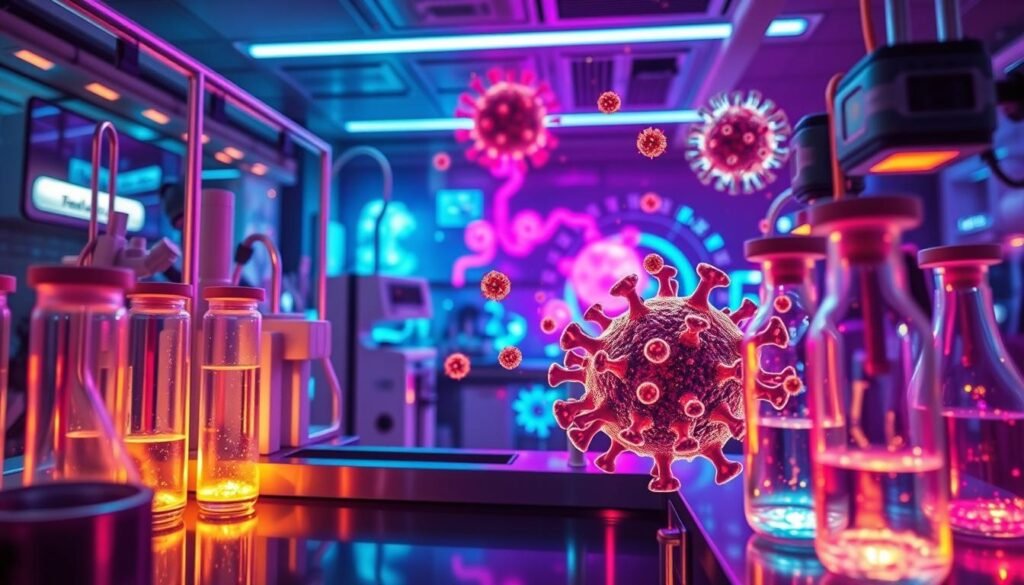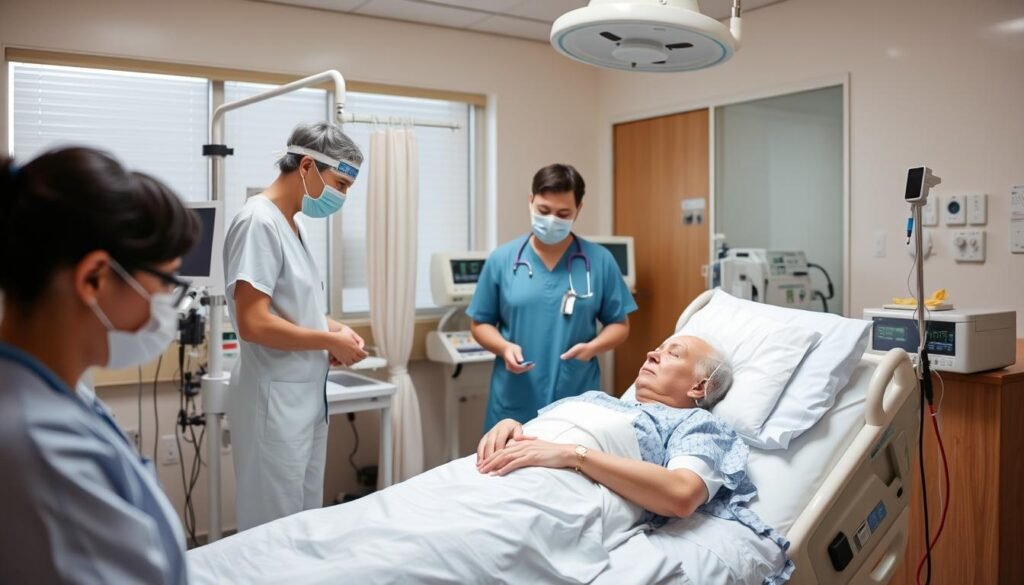Healthcare experts around the world are racing to find the best COVID-19 treatments. Have you wondered about the newest COVID-19 therapies and how they’re used? This guide will cover the latest medical advice, top antiviral drugs, and new ways to handle COVID-19 cases, from mild to severe.
Table of Contents
Key Takeaways
- Discover the latest COVID-19 treatment guidelines and protocols recommended by leading medical authorities.
- Explore the evolving landscape of antiviral medications and their role in managing COVID-19 infections.
- Understand the importance of early detection and diagnosis in ensuring optimal patient outcomes.
- Learn about the advancements in supportive care and immunotherapy for severe COVID-19 cases.
- Gain insights into the long-term management strategies and rehabilitation programs for COVID-19 survivors.
As the pandemic changes our lives, it’s key to stay current with COVID-19 treatments. Let’s explore the newest medical advice and the most hopeful developments in fighting this global health crisis.
Understanding COVID-19 and Its Impact on Global Healthcare
The COVID-19 pandemic has deeply affected global healthcare systems. It has tested their strength and ability to adapt. At the center of this challenge is the SARS-CoV-2 virus. This virus has evolved into many variants, each with unique traits.
Evolution of SARS-CoV-2 Variants
As the virus mutates, scientists watch for new variants. These new forms can spread more easily, be more harmful, or avoid the immune system. This means we need to keep updating our treatments and vaccines.
Transmission Patterns and Risk Factors
It’s important to know how SARS-CoV-2 spreads. Things like how crowded an area is, how clean people keep themselves, and their health can affect their risk. These factors can make a big difference in getting sick or having severe symptoms.
Disease Severity Classifications
COVID-19 can show up in many ways, from mild to very serious. Knowing how severe the disease is helps doctors decide the best treatment. This ensures those who are very sick get the care they need quickly.
| Disease Severity | Symptoms | Treatment Approach |
|---|---|---|
| Mild | Fever, cough, fatigue | Home isolation, symptomatic treatment |
| Moderate | Pneumonia, difficulty breathing | Hospitalization, oxygen therapy |
| Severe | Respiratory distress, organ failure | Intensive care, ventilator support |
Understanding COVID-19’s changes, how it spreads, and its severity helps doctors. They can then create better treatments, vaccines, and pandemic plans.
Current Standard Protocols for COVID-19 Treatment
Healthcare professionals are working hard to treat COVID-19. They use guidelines from top health groups. These guidelines help them treat the many symptoms and levels of severity caused by the virus.
Antiviral medications are a key part of COVID-19 treatment. Drugs like remdesivir stop the virus from spreading. Doctors choose the right medication based on each patient’s needs.
| Treatment Approach | Mild to Moderate Cases | Severe Cases |
|---|---|---|
| Antiviral Medications | Oral antivirals like nirmatrelvir-ritonavir or molnupiravir may be prescribed | Intravenous remdesivir is recommended, often in combination with other therapies |
| Supportive Care | Rest, hydration, and symptom management | Oxygen therapy, ventilator support, and intensive monitoring as needed |
| Immunomodulatory Treatments | Not typically required | Corticosteroids or other immunomodulatory drugs may be utilized |
Supportive care is also important. It includes rest, staying hydrated, and managing symptoms for milder cases. For severe cases, treatments like oxygen therapy and ventilators are used.
COVID-19 treatment is always changing. Doctors keep learning and updating their care to help patients. This is a global effort to fight the pandemic.
Early Detection and Diagnostic Approaches
Getting a quick and accurate diagnosis is key in fighting COVID-19. Many tests have been created to help find the virus early and guide treatment. These include PCR testing, rapid antigen testing, and antibody testing, each with its own benefits.
PCR Testing Methods
Polymerase Chain Reaction (PCR) testing is the top choice for finding COVID-19. It looks for the virus’s genetic material, giving a clear sign of an active infection. PCR tests are great for confirming cases and tracking the disease’s progress in studies and treatments.
Rapid Antigen Testing
Rapid antigen tests are known for their quick results and ease of use. They find specific proteins from the virus, helping make fast decisions. These tests are perfect for quick screenings in healthcare or during clinical trials with immunotherapy.
Antibody Testing Guidelines
- Antibody tests show if you’ve been exposed to the virus and if you might be immune.
- They’re useful in studies and for checking how well immunotherapy works and in clinical trials.
- Guidelines suggest using antibody tests carefully, as they don’t always show if you’re currently sick or how well you’re protected.
Using different tests together can help find the virus early, lead to quicker action, and aid in ongoing research against COVID-19.
Emergency Care and Hospitalization Criteria
As the covid-19 treatment landscape evolves, healthcare providers have set clear guidelines for when immediate medical attention is needed for COVID-19 patients. It’s important to know the signs and symptoms that require emergency care. Timely intervention can greatly improve patient outcomes.
The main criteria for emergency care and hospitalization include:
- Difficulty breathing or shortness of breath
- Persistent pain or pressure in the chest
- New confusion or inability to wake or stay awake
- Bluish lips or face
- Severe and unrelenting symptoms, such as high fever, severe cough, or severe fatigue
Patients showing these concerning signs are usually sent to the right level of care. This could be emergency departments, urgent care centers, or even hospital admissions. In some cases, convalescent plasma may be considered as a covid-19 treatment for hospitalized patients with severe or life-threatening illness.
“Early recognition of severe illness and timely initiation of supportive care are critical to improving COVID-19 outcomes.”
Understanding emergency care and hospitalization criteria helps individuals make informed decisions about seeking medical attention. This can greatly impact managing COVID-19 and ensuring the best possible patient outcomes.
Breakthrough Developments in Antiviral Medications
The world is still fighting the COVID-19 pandemic. Researchers and healthcare workers are working hard to find effective treatments. They are focusing on antiviral medications and improving treatment plans, especially with remdesivir.
Remdesivir Treatment Protocols
Remdesivir was first made to fight Ebola. Now, it’s a key drug for COVID-19. Studies show it can help patients with severe symptoms get better faster. Doctors are adjusting how they give remdesivir to make it work better.
Emerging Antiviral Options
Scientists are also looking at other antiviral medications for COVID-19. Drugs like molnupiravir, nirmatrelvir, and paxlovid are showing promise. They might help make symptoms less severe and lower hospital risks.
Combination Therapy Approaches
Doctors are also trying combination therapy. This means using more than one antiviral drug at a time. They hope it will make treatments more effective and prevent drug resistance.
As the pandemic goes on, new antiviral medications give us hope. They could lead to better care for patients. Healthcare workers and scientists are always looking for new ways to fight COVID-19.
Role of Immunotherapy in Severe Cases
The COVID-19 pandemic has pushed healthcare systems to their limits. Immunotherapy, including monoclonal antibodies, has become key in treating severe cases. It has shown great promise in fighting the worst symptoms of COVID-19.
Monoclonal antibodies are made in labs to mimic the immune system. They target specific parts of the virus, like the SARS-CoV-2. These treatments can help prevent serious illness in people at high risk. This includes those who haven’t built a strong immune response yet.
- Monoclonal antibodies can bind to the SARS-CoV-2 spike protein, preventing the virus from entering and infecting host cells.
- Early administration of these therapies has been associated with improved clinical outcomes, including reduced viral load and decreased risk of hospitalization.
- Combination therapy, using a cocktail of monoclonal antibodies, has further enhanced the effectiveness of these treatments in targeting SARS-CoV-2 variants.
Immunotherapy is a hopeful solution for severe COVID-19 cases. But, doctors must think about the benefits and risks. They look at the patient’s health, immune status, and the virus’s changes. Ongoing studies and real-world data help improve how we use immunotherapy against COVID-19.
“Immunotherapy has emerged as a crucial weapon in our arsenal against severe COVID-19 cases, providing a targeted and potentially life-saving approach for those most at risk.”

Vaccine Effectiveness and Booster Recommendations
The COVID-19 pandemic keeps changing, making vaccines and booster shots key in the fight against it. Knowing about the primary vaccine series, when to get booster shots, and special population needs is important. This info helps both healthcare workers and the public.
Primary Vaccination Series
The first COVID-19 vaccine series usually includes two mRNA vaccine doses (Pfizer-BioNTech or Moderna) or one Johnson & Johnson (Janssen) vaccine dose. This series greatly lowers the risk of serious illness, hospitalization, and death from COVID-19. It also works against different SARS-CoV-2 variants.
Booster Shot Timing
Even with the first series, booster shots are needed to keep the immune system strong. The CDC says people 12 and older should get a booster after their first series. The wait time for a booster depends on age and health.
Special Population Considerations
Some groups, like the elderly, those with weak immune systems, and people with health issues, need special vaccine and booster plans. Doctors often suggest personalized schedules for these groups to protect them best.
New vaccine development and clinical trials are key in understanding COVID-19 vaccines and boosters. They help healthcare workers and public health officials fight the pandemic.
| Vaccine Type | Recommended Dosage | Booster Interval |
|---|---|---|
| Pfizer-BioNTech | 2 doses, 3 weeks apart | At least 5 months after primary series |
| Moderna | 2 doses, 4 weeks apart | At least 5 months after primary series |
| Johnson & Johnson (Janssen) | 1 dose | At least 2 months after primary dose |
Home Care Guidelines and Self-Isolation Protocols
The COVID-19 pandemic keeps changing, and it’s key to know how to care for yourself at home. These steps help stop the virus from spreading and keep everyone safe.
If you have COVID-19 or mild symptoms, stay home. Use a “sick room” away from others. Try to use a separate bathroom. Make sure shared areas are well-ventilated and clean.
While you’re isolating, watch your symptoms closely. Look out for signs of worsening illness, such as difficulty breathing, persistent pain or pressure in the chest, or sudden confusion. If you see these signs, get medical help right away.
Here’s how to handle mild COVID-19 symptoms at home:
- Rest and drink lots of fluids.
- Use over-the-counter meds like acetaminophen for fever and aches.
- Wash your hands often and cover coughs and sneezes.
- Don’t share personal items with others at home.
- Clean and disinfect high-touch surfaces often.
Following these self-isolation and home care steps is crucial. They help stop covid-19 treatment and coronavirus therapies from spreading. By taking these steps, you help protect your family and fight the pandemic.
Long-Term COVID-19 Management Strategies
Healthcare experts are working hard to find ways to manage COVID-19 long-term. They focus on treating post-COVID syndrome, creating rehabilitation programs, and supporting mental health. These efforts aim to help COVID-19 survivors deal with ongoing challenges.
Post-COVID Syndrome Treatment
Many people still feel the effects of COVID-19 long after they first got sick. This is called post-COVID syndrome. It can cause symptoms like tiredness, brain fog, and breathing problems. Doctors are looking for new treatments to help with these lasting effects.
Rehabilitation Programs
- Rehab programs are being made to help COVID-19 survivors get better.
- These programs mix physical therapy, occupational therapy, and breathing help. They aim to fix physical problems caused by the virus.
- Many centers also offer mental health support and wellness programs. This helps with the emotional effects of COVID-19.
Mental Health Support
The pandemic has really affected people’s mental health. Healthcare workers are now focusing on mental health support. They know it’s key to help with the emotional and psychological effects of the disease.
| Treatment Approach | Key Highlights |
|---|---|
| Post-COVID Syndrome Treatment | Personalized care strategies to alleviate long-term effects, such as fatigue, brain fog, and respiratory complications. |
| Rehabilitation Programs | Comprehensive programs combining physical, occupational, and respiratory therapy, along with mental health support. |
| Mental Health Support | Integrated mental health services to address the psychological impact of COVID-19 on individuals and communities. |
As we face the ongoing pandemic, finding long-term management strategies is crucial. These efforts help COVID-19 survivors recover fully. Healthcare workers are dedicated to improving treatments and rehabilitation. They aim to help survivors rebuild their lives and find recovery.

Prevention Strategies and Risk Mitigation
As the COVID-19 pandemic keeps changing, it’s vital to keep up with prevention and risk reduction. We focus on personal protective equipment (PPE), social distancing, and vaccine development.
Using PPE like face masks can greatly lower virus spread. Health experts say to wear good masks in crowded or not well-ventilated places. Also, staying at least 6 feet away from others outside your home helps reduce risk.
Developing and getting coronavirus therapies and vaccines is a top global goal. Vaccines are a key tool in stopping severe COVID-19 and easing healthcare system pressure.
Vaccine Development and Booster Shots
The COVID-19 vaccines have shown great success in trials. But, their protection might lessen over time. So, getting booster shots is advised, especially for those at higher risk of severe illness.
- Primary vaccination series: Two doses of mRNA vaccines or a single dose of Johnson & Johnson
- Booster shot timing: Recommended 2-6 months after the primary series, depending on individual risk factors
- Special populations: Immunocompromised individuals, older adults, and those with underlying medical conditions may require additional booster doses
By using a wide range of prevention methods, we can fight the COVID-19 pandemic together. This includes PPE, social distancing, and timely vaccination.
“Vaccination, along with other preventive measures, remains our best defense against COVID-19 and its variants.”
Latest Research and Clinical Trials
The fight against COVID-19 is ongoing. Researchers worldwide are exploring new ways to treat and prevent it. We’ll look at the latest research and clinical trials that are changing how we manage COVID-19.
Emerging Treatments
New treatments are being tested, besides the ones we already know. These include experimental drugs and convalescent plasma from people who have recovered. Trials are checking if these treatments are safe and work well.
International Study Results
The pandemic has led to research and clinical trials in many countries. By sharing their findings, researchers are learning more about COVID-19. Studies from Europe, Asia, and the Americas have given us important insights into treating and preventing the disease.
The scientific community’s hard work gives us hope in fighting COVID-19. Keeping up with the latest research and trials helps everyone make better choices. Together, we can beat this pandemic.
Conclusion
The fight against COVID-19 has seen big steps forward. Doctors and researchers are now better at handling this global crisis. They’ve learned about new virus types and found new ways to test and treat patients.
The pandemic has been tough, but medical teams and health experts have shown great strength. They help us understand how to stay safe. Knowing the latest treatment options helps us protect ourselves and our communities.
Managing COVID-19 is a never-ending task. It takes teamwork from doctors, leaders, and the public. By working together and listening to medical advice, we can face future health issues with confidence and strength.
FAQ
What are the current standard protocols for COVID-19 treatment?
Today, COVID-19 treatment combines antiviral meds, supportive care, and proven therapies. Health groups like the World Health Organization (WHO) and the Centers for Disease Control and Prevention (CDC) update these guidelines often.
How do different COVID-19 severity levels affect treatment approaches?
Treatment for COVID-19 changes with the disease’s severity. Mild cases might just need home care and managing symptoms. But, more serious cases might need hospital care, oxygen, and antiviral meds.
What are the key diagnostic methods for detecting COVID-19?
To find COVID-19, doctors use PCR tests, rapid antigen tests, and antibody tests. Each has its own benefits and is used for different needs, like finding active infections or past exposure.
What are the criteria for emergency care and hospitalization for COVID-19 patients?
If you have severe symptoms like trouble breathing or chest pain, get help right away. Doctors use special rules to decide if you need emergency care or hospitalization based on your symptoms and risk factors.
How effective are the current COVID-19 vaccines, and what are the booster recommendations?
The COVID-19 vaccines are very effective in preventing serious illness and death. Some people need booster shots to keep their protection strong, especially against new variants. The timing and who gets boosters can change based on health guidelines.
What are the long-term management strategies for COVID-19 patients?
For long-term COVID-19, treatment focuses on post-COVID syndrome, rehab, and mental health support. Researchers are working hard to understand and treat the long-term effects of the disease.
What are the latest developments in COVID-19 antiviral medications?
There’s been big progress in COVID-19 antiviral meds. Remdesivir is approved for some cases, and scientists are looking into new options, like combining treatments, to better fight the disease.
How does immunotherapy play a role in severe COVID-19 cases?
Immunotherapy, like monoclonal antibodies, is showing promise for severe COVID-19. These treatments aim to boost the immune system and manage severe symptoms.
What are the latest research and clinical trials focused on COVID-19 treatment?
Researchers are exploring new treatments, including antiviral meds, immunotherapies, and combinations. Studies from around the world are helping us find better ways to manage COVID-19.



